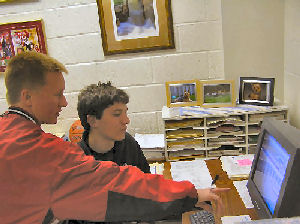Innovation May Save Lives
Mason Is One of Few High Schools
To Benefit from Impact Testing
By
Christie Ankeney and Alex Pender (March 25, 2006)
As senior
guard Maggie O’Toole fought for a loose
ball in a hotly contested basketball game on February 7, one of
the Highland players
accidentally elbowed her in the forehead. The game was temporarily stopped when O’Toole,
who was somewhat dazed and dizzy, got helped off the court for a
head injury. O’Toole was then taken out of the rest of the game,
and, as it turned out, the rest of the week.
 The
day following the game, although O’Toole thought
she was fine, Athletic Trainer, Vicki Galliher could
not ignore the results of the IMPACT (Immediate Post-Concussion Assessment
and Cognitive Test) O’Toole had recently taken compared to the pre-season
baseline test she had taken. “I know the results from the test didn’t
come out very good so I understood why she [coach Galliher] held
me out all week, but my head really felt fine and I felt good enough
to play,” O’Toole told Lasso Online. However, in spite of O’Toole’s
feelings that she was well enough to play, the results of her post-concussion
IMPACT test told Galliher that, for health and medical safety, O’Toole
needed to sit out a few games.
The
day following the game, although O’Toole thought
she was fine, Athletic Trainer, Vicki Galliher could
not ignore the results of the IMPACT (Immediate Post-Concussion Assessment
and Cognitive Test) O’Toole had recently taken compared to the pre-season
baseline test she had taken. “I know the results from the test didn’t
come out very good so I understood why she [coach Galliher] held
me out all week, but my head really felt fine and I felt good enough
to play,” O’Toole told Lasso Online. However, in spite of O’Toole’s
feelings that she was well enough to play, the results of her post-concussion
IMPACT test told Galliher that, for health and medical safety, O’Toole
needed to sit out a few games.
Anyone who has played a sport recently at George Mason, knows that everyone has to take “The IMPACT Test,” but
few actually know how much it truly helps. “The IMPACT test takes
a snapshot of your cognitive and visual processing abilities pre-injury,” said
Galliher. The IMPACT Test is a series of cognitive, memory,
hand-eye coordination, and visual-processing tests that takes approximately
22 minutes to complete. “Less than 270 high schools in the U.S. have
the IMPACT Testing,” said Galliher who added
that “close to 20 Mason athletes have benefited from the IMPACT testing
after having sustained a concussion over the past two years.”
“The
IMPACT testing software protocol was developed at the University of Pittsburg
Medical Center by Dr. Michael Collins and Dr. Mark Lovell,” Galliher
explained. Galliher attended a week-long training session in Pittsburg two
summers ago to learn how to properly administer and interpret the
results of the test.
There are varying levels of concussions
and each needs to be examined and analyzed with regard to their associated
symptoms, including but not limited to, loss of consciousness and
for how long, amnesia (retrograde – prior to injury and anterograde – after
injury), nausea, and general pain. When
our George Mason athletes have experienced a concussion or head injury, Coach Galliher consults
with Dr. Collins or other neuropsychologists in
interpreting the results of an athlete’s post-concussion IMPACT test
results.
Historically, the average recovery time given for
mild concussions by health care professionals was 1-2 weeks. Through extensive neuropsychological research
over the past 10 years, medical
professionals specializing in the study of head injuries and concussions
have found longer periods of recovery are necessary, especially for
high school athletes. The teenage brain is still maturing and takes
longer to recover from even mild concussive head injuries. This is why IMPACT Testing at the high school
level is so important and so effective. “Impact Testing allows us
to provide more comprehensive evaluation and care for our athletes
who have experienced head trauma,” said Galliher.
Along with the computer-based IMPACT Testing, Galliher
uses a Sideline IMPACT testing which enables her to test athletes
right on the field or court. “The
software is loaded on a palm pilot and allows me to asses an athlete
suspected of having a head/brain injury right on the side line. The
sideline IMPACT scores can then be compared immediately with an athlete’s
baseline scores, which are stored on the palm pilot. Very few high schools have this.”
“IMPACT testing is one of the most
important medical tools we will ever put in place here”, Galliher said.
Along with a select number of high schools in the U.S.,
IMPACT Testing is used by 16 NFL teams, US Soccer, Professional Baseball,
100+ universities, Professional Hockey, USA Women’s Olympic Hockey
and many more professional sports.
As for O’Toole, she sat out for
a week and missed three games but in the end led her team to the
regional tournament.
Coach Galliher says that “ensuring
an athlete has sufficiently recovered from a head injury prior to
clearing that athlete to return to play is critical, that’s why we
have the IMPACT Testing.”

